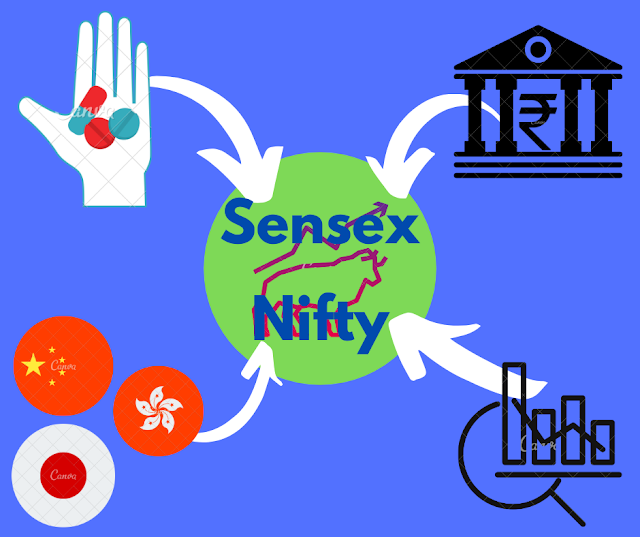
Today is the 40th day of lockdown in India. Revenue of many companies is affected due to the country-wide lockdown. The stock market is still soaring. Why?

1. Remdesivir's positive results
CEO of Gilead Sciences announced the results of a recent trial in an open letter. He stated - "patients with COVID-19 who received Remdesivir recovered faster than similar patients who received placebo." This is positive news in times of uncertainty and it pushed the stock price of the company by 2.32% in one week. It also improved the overall sentiment of domestic and global markets.
There is an evident correlation between the search results of the keyword Remdesivir and the up-trend in Sensex.
The positive results of Remdesivir also influenced the markets in Asia. Asian markets have a considerable impact on the Indian stock market, and the gain in the Hang Seng Index of Hongkong and Nikkei of Japan pushed the Sensex in the upward direction.
2. Stimulus in India
In the past government of India had announced a 1.7 lakh crore stimulus package to help people impacted by coronavirus. Yesterday, Prime Minister Narendra Modi held a meeting with Finance Minister Nirmala Sitharaman to solidify the plan for the second round of stimulus package for the sectors impacted by COVID-19. This news came as a respite to the Indian stock market and became one of the reasons for a spike in the last few days. Stimulus in India has a similar correlation with the uptrend in the stock market as the news of Remdesivir.
3. F&O Expiry
April 30th was the last Thursday of the month and expiry day for futures and options. Many traders had shorted (see Appendix to understand shorting) the market thinking that it would go even lower. The uptrend in the stock market at the end of the month forced those traders to cover their short positions by buying the stocks or other securities that have been sold short to avoid loss if the prices go even higher. This buying trend pushed the overall market to go up. ONGC was the top gainer in Sensex, and Tata Motors was the top gainer in Nifty with a price rise of 13.40% and 19.32%, respectively.
Conclusion
Related Articles:
Conclusion
In a nutshell, it was observed that the positive news of the drug Remdesivir gave a ray of hope to Wall Street and its ripple effect was seen in Asian and domestic markets.
Another news about an upcoming stimulus package by Indian government for the impacted sectors helped to improve the stock market. Lastly, F&O expiry day also contributed to the uptrend of the market.
Appendix
1. Short Selling - Shorting selling is a way of trading stocks when a trader borrows shares and then quickly sell them at the current market price in the hope of buying them at a lower price in future and return the borrowed share to the lender.
Made with Love (StockyLab Team)
On a mission to make stock picking easier for everyone.
Please leave your comments/questions below. We are listening.
Business Standard
Gilead
Indian Express
Money Control
Comments
Post a Comment